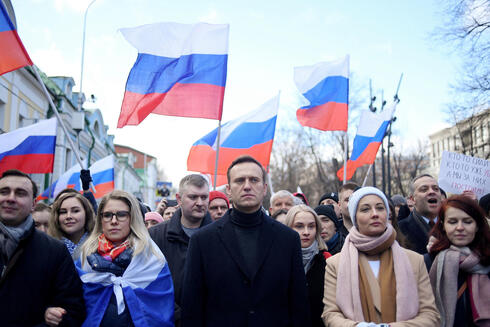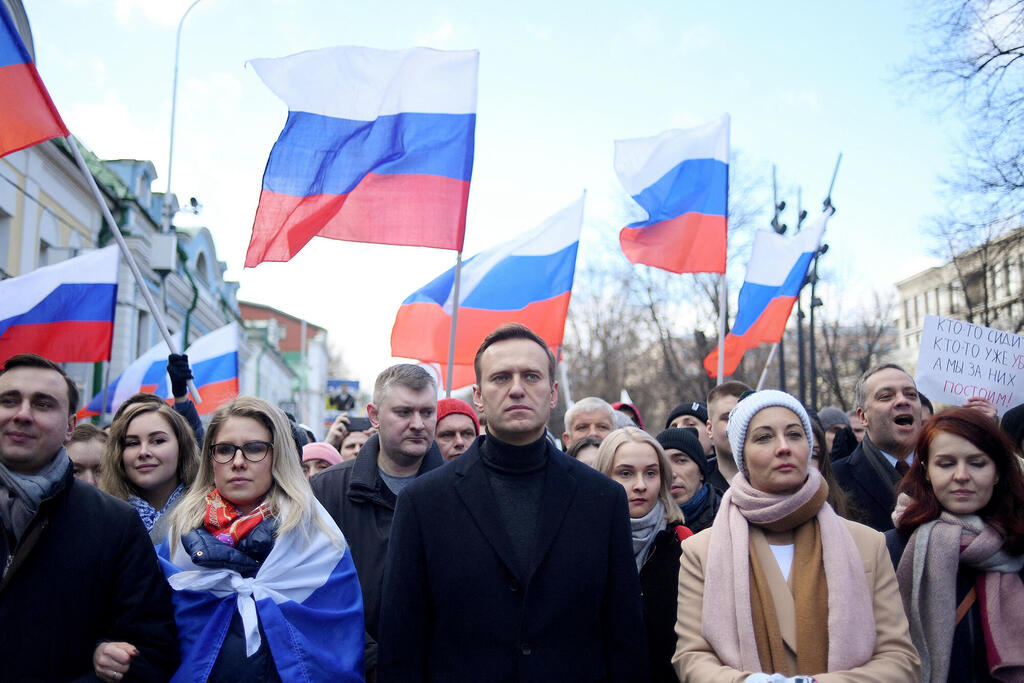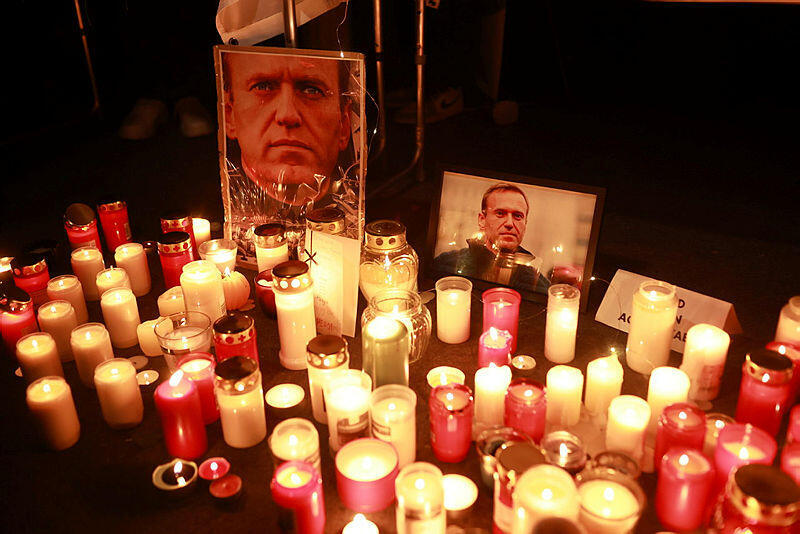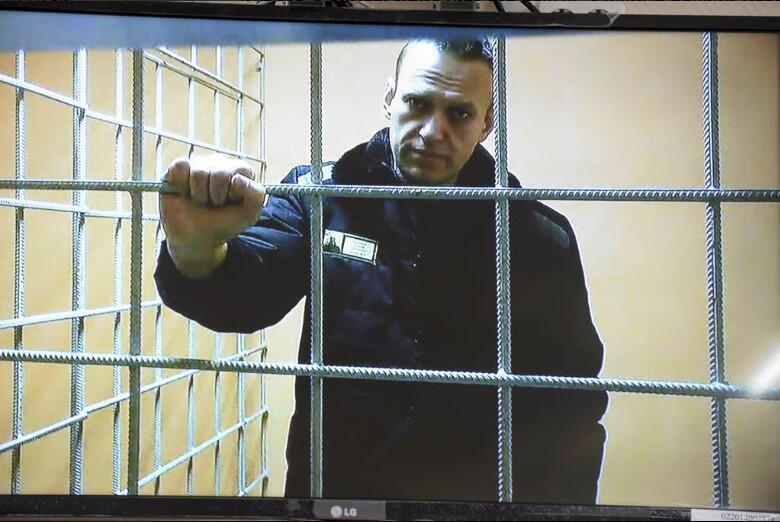
Navalny’s murder: The final stage of Putin’s transformation of Russia into a fascist state
Each stage of Vladimir Putin's struggle with the charismatic opposition leader Alexei Navalny symbolized with chilling precision Russia's transformation from a young and flawed democracy to a hardening autocracy, and finally to a fascist totalitarian state
The death of Alexei Navalny in the frozen Russian penal colony in the Arctic Circle is a tragedy of truly global proportions, for in the eyes of Russians and the entire world, Navalny symbolized the only desired alternative to what Russia has become after 24 years of Vladimir Putin's rule: the first fascist power of the 21st century. The term "fascist" has been greatly diluted since the end of World War II, and as a result, charges of fascism are often conveniently dismissed as hyperbole that fails to present an accurate description of reality. However, Navalny's struggle against modern Russian tyranny vividly illustrates Russia's gradual transformation from a young and flawed democracy to an increasingly rigid autocracy, and ultimately, to a fascist totalitarian state.
Navalny began his political career in the 2000s as a liberal democrat with right-wing nationalist inclinations. While he fought against the menacing corruption of the Putinist establishment and its oligarchic cronies, he also advanced an agenda that could be considered xenophobic, demanding tightened control over labor migration from the Caucasus and Central Asian countries and occasionally using rhetoric dangerously close to bigotry. However, over time, as Navalny distanced himself from nationalist circles, he moved closer to the liberals, while the Russian regime drifted away from its proclaimed liberalism and absorbed the nationalists with slight adjustments.
The wave of protests that swept Russia in 2011–2012, when Putin and Dmitry Medvedev swapped the Russian presidency and premiership, propelled Navalny to the forefront of the Russian opposition. He emerged as the most charismatic leader, with a track record of exposing systemic corruption and impressive organizational skills. Despite stirring controversy within liberal opposition ranks, his political courage and determination compelled even his detractors to acknowledge that they lacked his fortitude and resolve.
Navalny's next step was to run for mayor of Moscow. The regime responded with a fabricated criminal indictment, devoid of evidence, and sentenced him to five years in prison. Yet, the Russian authorities were not as strong at the time, and the public outcry following the verdict, alongside moderate international pressure, led to a change in the sentence to a suspended prison term. In the elections themselves, Navalny, in a completely independent campaign, garnered close to a third of the votes according to official counts, which undoubtedly tilted in favor of the establishment candidate, Sergei Sobyanin.
From massive protests to deathly silence
The annexation of Crimea and the beginning of the proxy war against an increasingly westernized Ukraine in 2014, led to the final rupture between the nationalists and Navalny. While it only intensified his struggle against Putinism, most were pleased to join the anti-Western backlash promoted by the Russian regime. The war in Ukraine gave Putin a strong political boost, resulting in a sharp rise in his popularity and confidence in his ability to rule Russia as he pleased. Furthermore, the Western response to Russian aggression was weak, even compared to the response to the Russian invasion of Georgia in 2008.
They also reacted more strongly to Navalny. His brother, Oleg, was imprisoned for three and a half years on trumped-up charges, and when Navalny announced his intention to run for the presidency in 2018, the authorities simply disqualified his candidacy "due to a criminal record." Moreover, they brazenly disregarded the ruling of the European Court of Human Rights — of which Russia was a member and had committed to comply with its decisions — which demanded that they reverse the disqualification, which they viewed as political persecution, and allow Navalny to run.
Even after this disqualification, which made it clear that Putin would not allow him to be a legitimate politician, Navalny continued to expose the serious corruption of establishment figures. However, the establishment only grew stronger. At this stage, the Russian economy became corporatist — most major companies in the economy were directly or indirectly linked to the state, and proximity to Putin became essential for any serious Russian entrepreneur. Even in the realm of small businesses, the state demonstrated that the protection of private property was not a sacred Russian value: any business or bank account could change ownership if those in power simply nodded their heads. Naturally, given the treatment Navalny's family and supporters received in the Russian legal system, they also became compliant pawns of the regime. Under these conditions, it is no wonder that institutional corruption in Russia crossed all limits.
From a foreign policy perspective, the Russian Federation no longer settled for direct and indirect attacks on its neighbors but extended its immense and lethal influence network globally and particularly in the West. The Putin regime bribed Western politicians, funded extremist movements from both the right and the left, intervened in wars in the Middle East and Africa through both the official Russian army and the mercenary Wagner Group, led by oligarch Yevgeny Prigozhin. Putin saved foreign dictators like Syrian Bashar al-Assad and Belarusian Alexander Lukashenko, and openly supported and hosted delegations of terrorist organizations like Hamas and the Taliban. In a particularly bold move, he used chemical weapons to eliminate those he defined as "traitors," including on the territory of Western democracies.
In the summer of 2020, on a flight to Moscow, Navalny himself was also poisoned. He survived only thanks to a series of miracles, which included the courageous decision of the pilot to land immediately, and the no less courageous decision of the ambulance doctors, who waited on the landing strip to inject atropine into the poisoned man. His survival was also aided by the fact that Putin was not yet ready to publicly admit the poisoning and openly confront world leaders.
However, Navalny's decision in 2021 to return to his country and continue his struggle after recovering was the final straw for the Russian establishment. Navalny was arrested immediately upon landing in Moscow, charged with violating the terms of his parole, swiftly sentenced, and sent to prolonged imprisonment. The authorities also made sure to crush any demonstrations of support for him with an iron fist.
Navalny's poisoning and imprisonment made it unequivocally clear that the Putin regime had removed the veil masking their intentions, ending the facade that Russia was any kind of democracy or abided by the rule of law. Throughout 2021, Navalny's prison conditions grew worse and additional criminal cases were opened against him, adding more and more years to his sentence. His supporters were relentlessly persecuted, and those who did not manage to escape Russia's borders were arrested and imprisoned. This was the final showdown, in which all opposition in Russia was destroyed, and all non-compliant media outlets were completely silenced.
The beginning of 2022 showed why all this was necessary when Russia launched a total war of conquest against Ukraine. While on the one hand, Russian state media was forbidden to call the invasion a "war" (and this prohibition was enforced with actual imprisonment), they also made great pains to emphasize that this was more than just a war with a neighboring state, but a struggle for life and death against the entire West and its liberal values. The process of uprooting these values in Russia was completed in the first weeks of the war as Western internet channels and social networks were blocked, and the last members of the opposition fled the country.
Meanwhile, Navalny's conditions in prison became a constant torment: additional charges prolonged his imprisonment by another 19 years, and the imprisonment itself became a series of daily abuses, including denial of necessary medical treatment, cutting off all contact with the outside world and his family (except for rare visits by his lawyers, who were also persecuted by the authorities with absurd charges), and a long series of solitary confinement in harsh conditions. Over the past three years, Navalny has been put in solitary confinement 27 times, totaling 295 days.
Yet even all this was not enough to break Navalny's spirit. Though underfed and sick, he refused to surrender and continued to speak to his supporters (through messages conveyed by his lawyers) and to his enemies using the same language he used at the height of his power. Putin may have imprisoned and abused Navalny, but he failed miserably in his attempt to break him. It will likely be a long time before the exact circumstances of his sudden death are known, but even now his supporters are certain that their leader was simply murdered by his jailers.
Navalny's death does not symbolize the final decline of the Russian regime into fascism — that occurred with his imprisonment upon his return to Russia in January 2021 and the attempt to annex Ukraine. This death, or perhaps more accurately, this murder symbolizes Russia's internal capitulation to this terrible transformation. Everyone there understands that there is virtually no chance that Navalny's name will evoke a popular protest in the style of the massive protests of 2011-2012, the much more modest protests of 2018, or even the scattered protests after his arrest in 2021. As of today, the Russian people have resigned themselves to their fate, and even Putin's greatest opponents are afraid to take to the streets.
Putin victorious?
On the surface, it appears that Putin has triumphed and uprooted any semblance of internal resistance to his rule. His subjects are preoccupied with surviving, and his opponents are either dead, in hiding or in exile. The Russian army, despite terrible losses, continues to slaughter Ukrainians, who are really the only force that dares to stand against the new fascist power and its aging dictator. The West, despite their rhetoric, has failed to impose crippling sanctions on Russia and even continues to engage in trade and diplomacy with it, while those opposed to the West and its values see Putin as a sort of messiah and a model of defiance against the liberal order, and are celebrating his apparent victory.
However, history teaches us never to be complacent. Modern Russian fascism has a peculiar and significant uniqueness: unlike its historical predecessors who embraced fascism and seized power in their countries when they were relatively young, who nurtured a real cult of masculinity from the Aryan race and encouraged and recruited the raw and violent energy of the young mob, Putinist fascism is a somewhat "late" ideological product - elderly and fearful of the masses. The Russian regime invests all its vigor and resources in atomizing Russian society and isolating its subjects, preferring to forgo both the honey and the sting of a mobilized society.
Over the years and especially after the outbreak of the coronavirus pandemic, Putin has increasingly isolated himself from his family, his political environment, and the annoying plurality of opinions around him. Navalny was the embodiment of his nightmares: a charismatic young man surrounded by a loving family and sharp-tongued and thoughtful young supporters, and a true leader of the people.
At the moment, Putin and his few close associates feel confident enough in their power to think that murdering Navalny and making him into a martyr of Russian liberty will not harm them. However, history has proven that understanding reality is not a skill possessed by elderly, paranoid, and isolated tyrants.
















